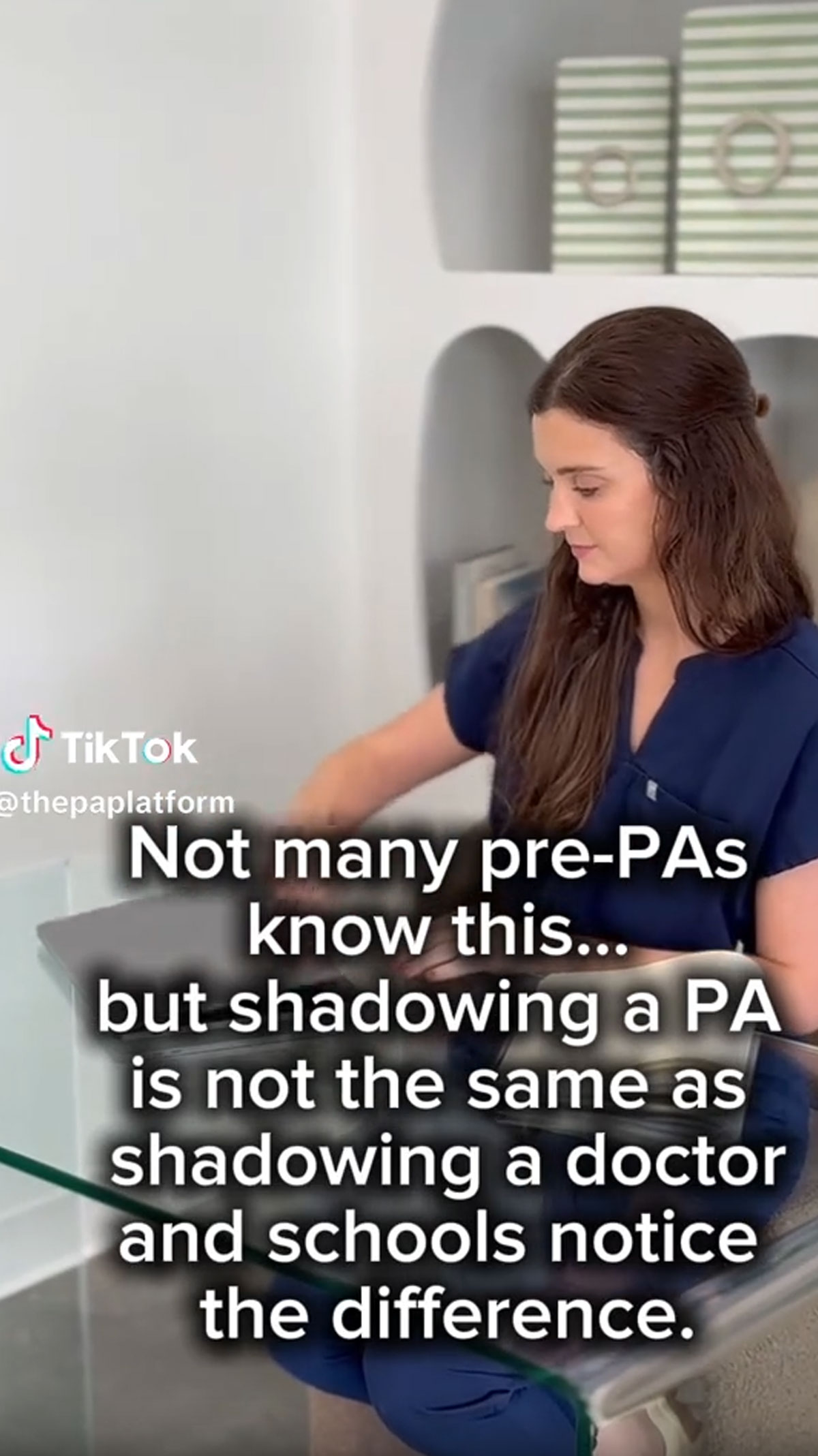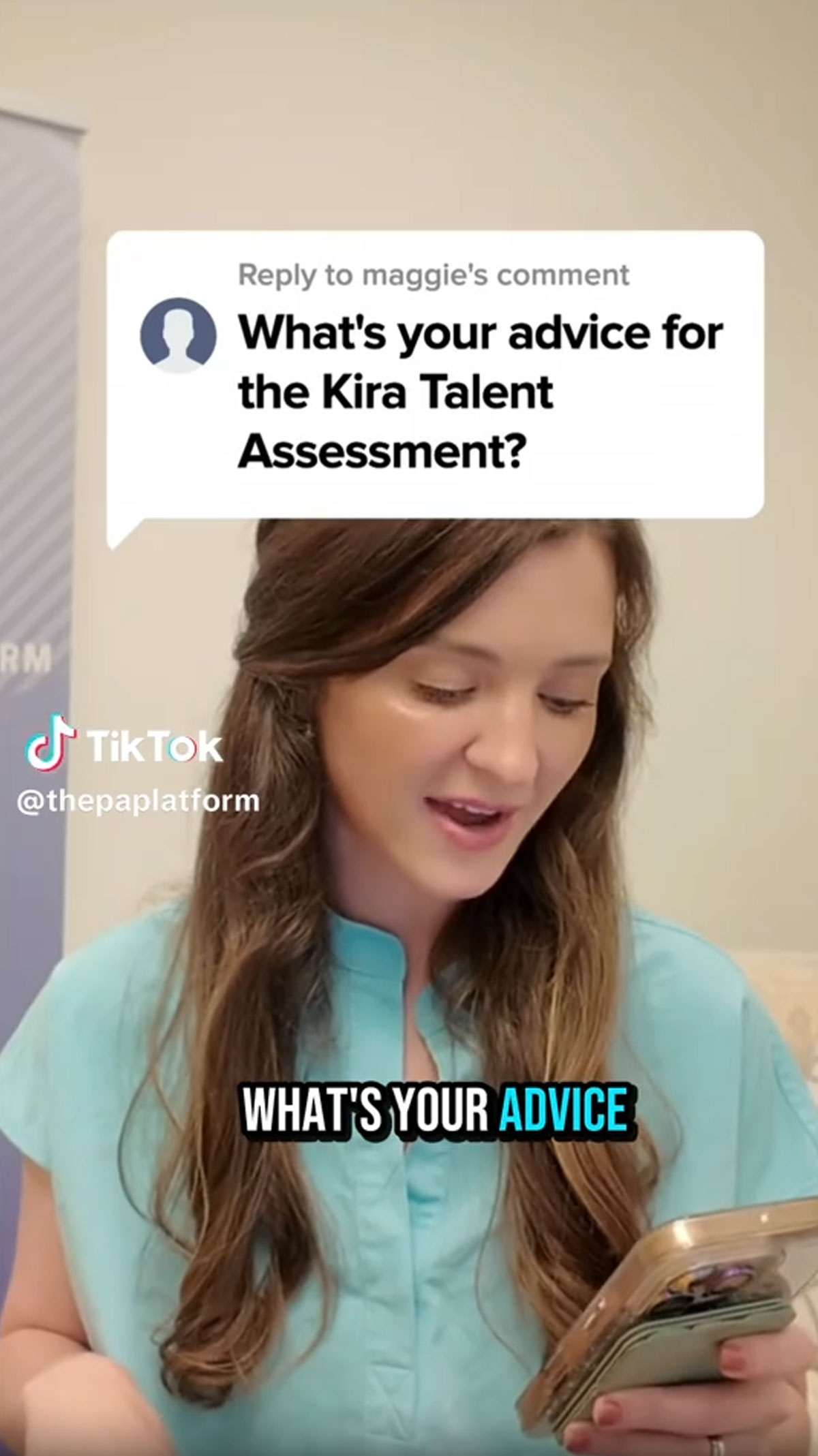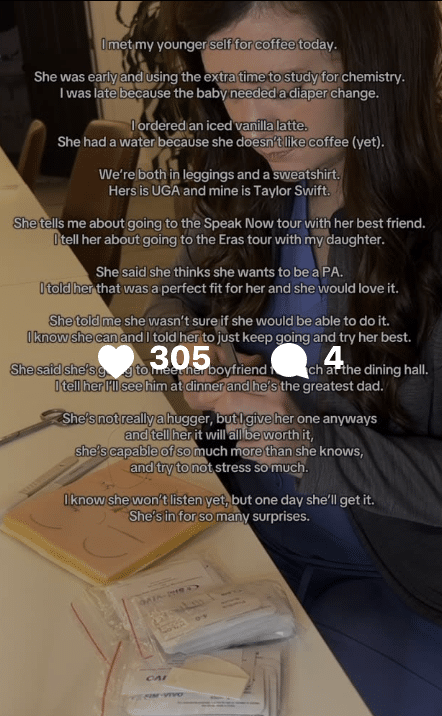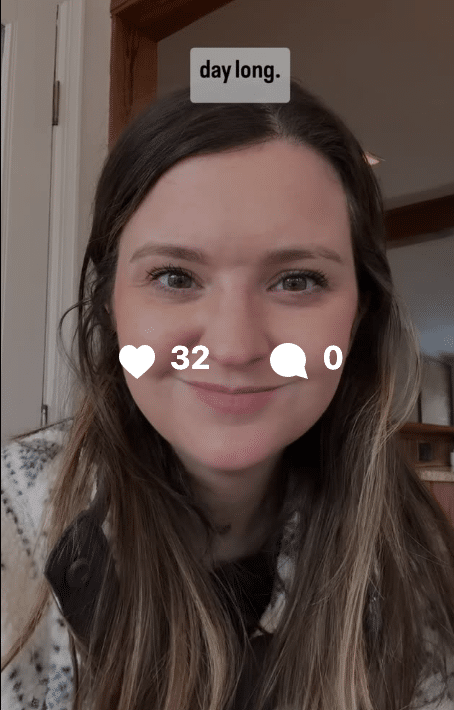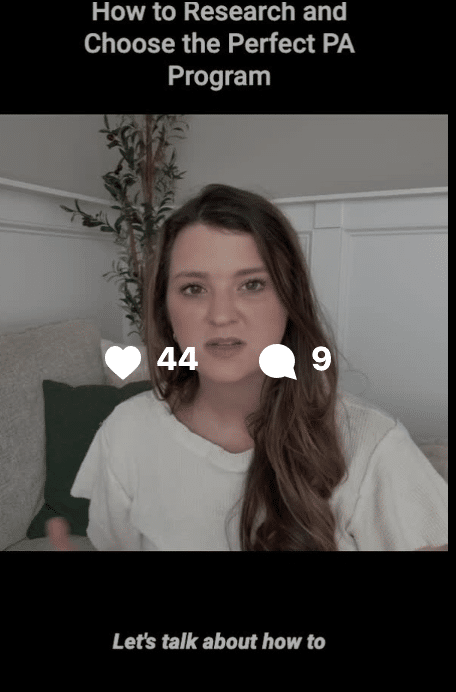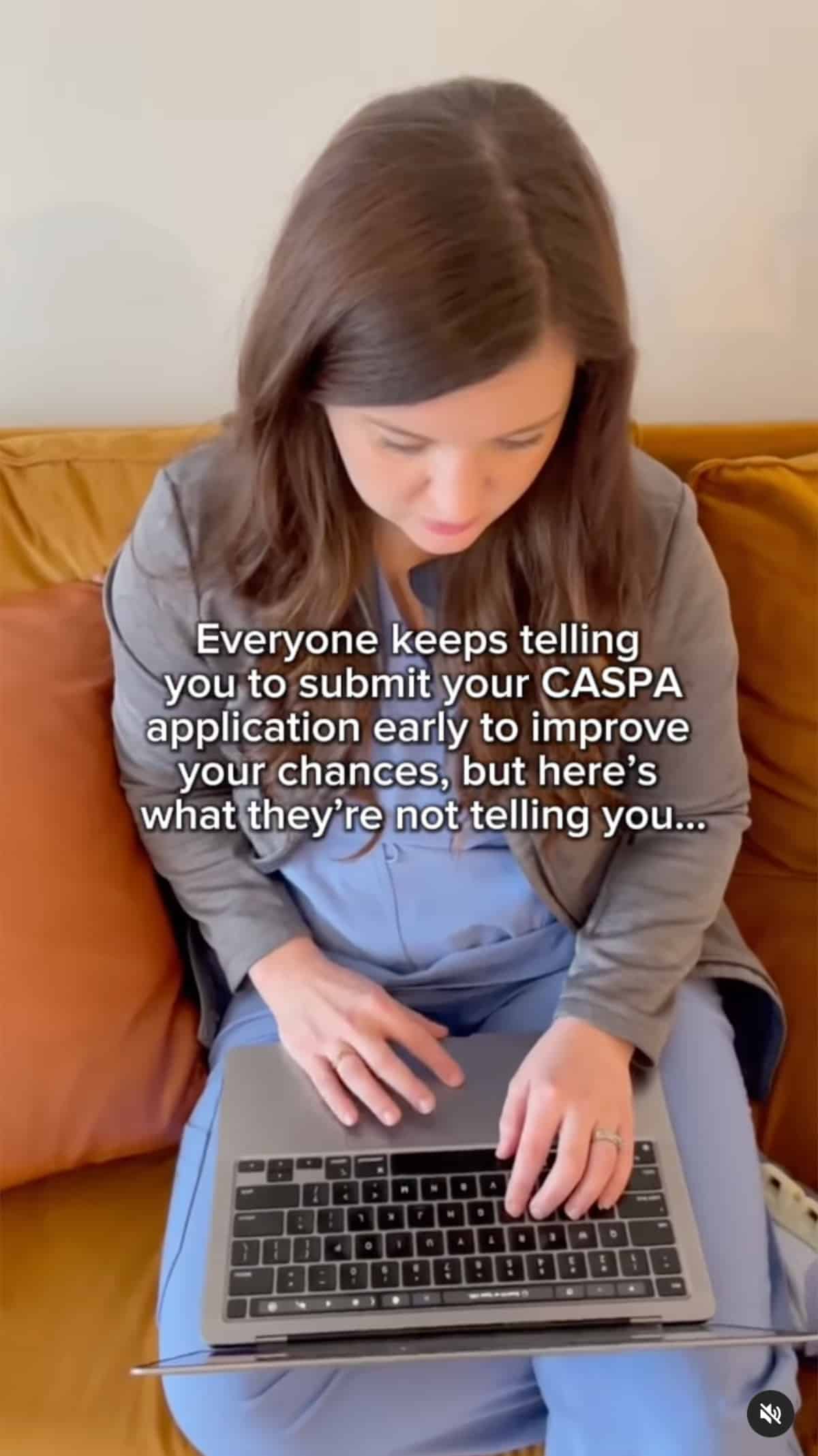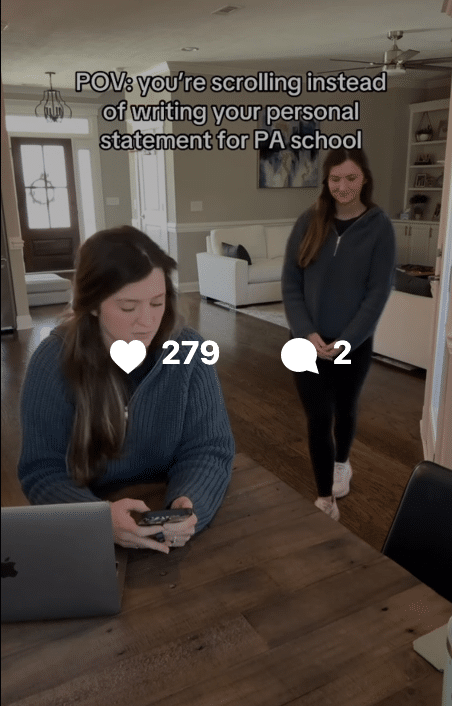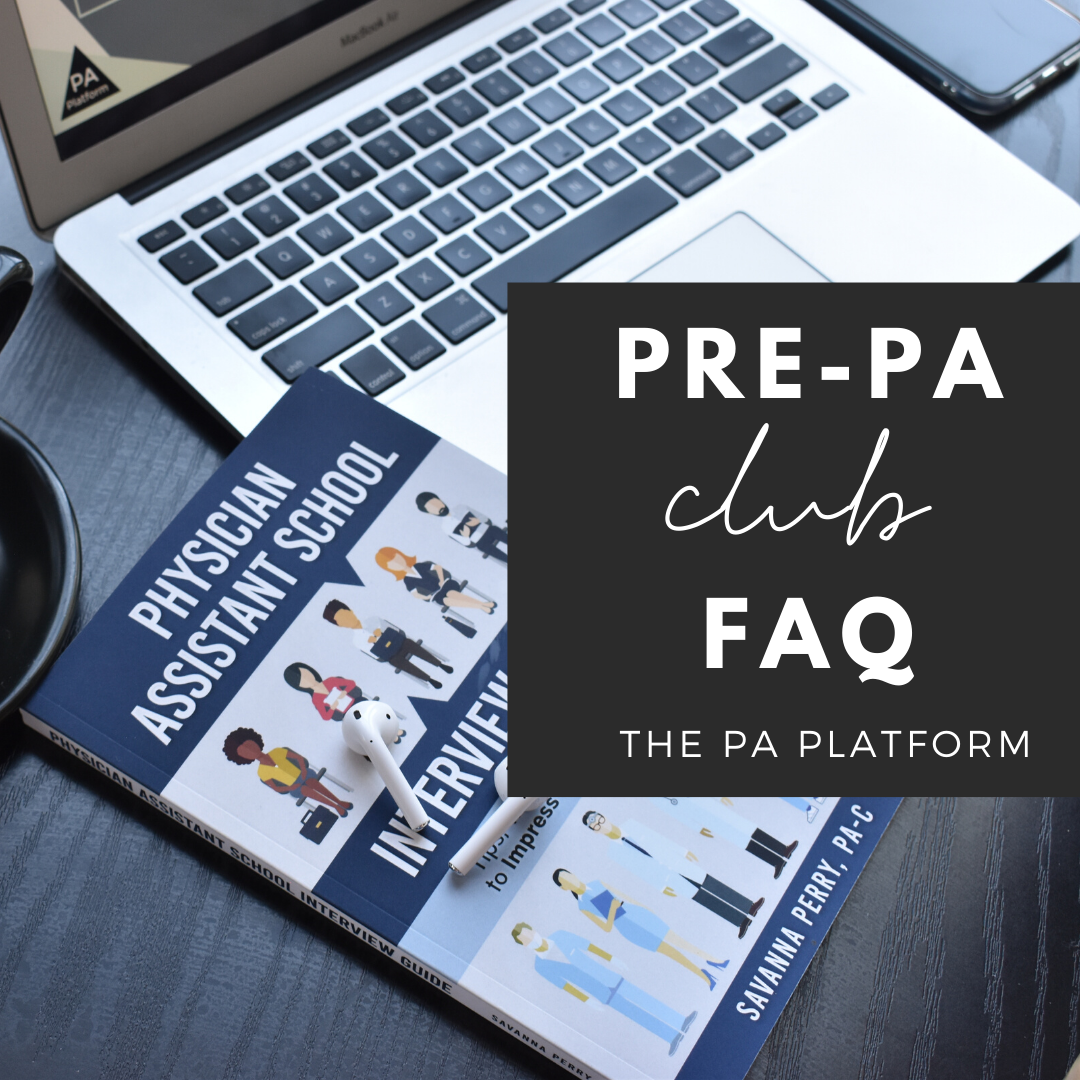
This week, I am sharing a Q&A session I had with a Pre-PA Club that I recently Skyped into. If you are apart of a Pre-PA Club, let me know! I would love to Skype in and chat with you all. This club had a lot of great questions that I think you all will benefit from too 🙂
Q: Since we are talking about hours, are there any general rules of thumb, how many hours one year of full time work would translate to?
A: In general, one year of full time work is 2,000 hours. You can kind of split that up too so a year working part time is about 1,000 hours or if you work full time for half a year that’s about 1,000 hours.
Q: Is there a preference for the kind of healthcare hours, such as being a medical assistant?
It depends on the programs you’re applying to that. That’s very program dependent whether experience counts or how it counts or how it adds up. Definitely look at the programs you’re interested in, if they don’t specifically have your experience listed as what they consider it on the website. Ask them. These programs are very happy to help and answer questions. and they would even prefer you ask rather than just apply and not have the experience that they are looking for. When you contact them, I personally prefer email for contact because it leaves a paper trail. If they were to come back and say, “oh, that doesn’t fit what we are requiring”, you say well I actually asked and he said it did on this date — just to go have something to fall back on. Now, whether that would do anything or not, because they have the final say, who knows. I would just double check the websites, and there’s just nothing set across the board every single person is so different.
Q: I know you mentioned you have a whole book about interviews, but do you have any short tips you can give us for people apply soon and have upcoming interviews?
I could talk about interviews forever and ever and which I do during the interview course. One of my key point is that the biggest mistakes I see in interviews, is a lack of confidence. I know you’re nervous. Everyone’s nervous, you just have to kind of accept that and not let that get in the way. The other thing I see is people not giving thorough, complete answers. a lot of people stay very superficial with their answers. A good rule of thumb, if what you’re saying could be looked up on Google, it’s too generic. It needs to be personal. You’ve got to show them who you are.
If you get to the point of having an interview that’s a big deal because at this point in time schools are getting thousands of applications. They then have to take that number down to a couple hundred maybe that will get interviews. Usually schools will interview 2-4 people for one spot. I mean you’re looking at a 50% chance that you’re going to get accepted. At that point this even playing field where the schools are really just looking to see if you’re a normal person. If you would fit in well with their class because they do have some things that they tend to look for. Plus they want to make sure you like the program. It’s just a little bit of a hurdle but if you can get past them and show them that you’re ready for PA school.
Lastly, keep in mind that you are applying for an interview for PA school you’re not applying for a position as a PA. So no matter how much experience you have or shadowing or whatever like you’ve got to assume the role of a student and show that you’re going to be able to succeed academically and be someone who is receptive to instruction and ready to get in there and learn. You want that school to be the place that you do that.
It comes down to just really the confidence is the big thing and then not any major red flags. An example being, how you couldn’t get into med school or not knowing the name of your profession and saying physician’s assistant, some people are really, really care about that. Just try to show yourself but also, not being too nervous. Every interview is different too. Some of them like the MMIs don’t give you as much of a chance to show your personal background is more about being able to show different personality traits and how you interact with patients how you communicate. You have to really be ready for anything and ready to walk in, and do the best you can. It’s only a few hours and you need to leave everything on the table.
Q: It’s been a while since I looked at CASPA but there is a part that asks if you are apart of any organizations. Do you recommend joining AAPA or any other paid organizations?
Yeah, you can definitely list like your list your society which would be great. I think there is value in being involved in either state or national organizations even on a pre-PA level. I don’t know how y’all state’s society, if it’s really involved or not. I know some, some allow for pre-PAs, some don’t. The way I look at it is, for example, let’s say you apply and you had the same stats as another person. Is this school looking at two different people to your applications, trying to differentiate them, and they see okay we’ll see student A is a member of AAPA and they are supporting the profession. That shows a level of involvement that they hope will continue as a PA student and as a PA where you’re supporting your profession as a whole. You’re not just somebody who goes to work and goes home. So I think it is recommended to join a state or national society. I don’t think it’s 100% necessary but do you think it’s that gold star that makes them go, “Oh, well this person is actually invested in this”, and it’s that little like extra sprinkle on your application.
Q: What kind of questions should you ask the faculty at the end of your interview with a school? You want to come up with something, right?
Yes, but you’ve got to feel out the situation and feel out your interviewers. You can’t necessarily have a set thing you’re going to ask because you may just like get a weird vibe or it may be like short on time. You just have to see how it goes. There’s a few different ways to approach it. Number one, any questions that you feel like you really want to know the answer to that aren’t already answered online, at a tour or by student, definitely use that opportunity to ask those questions. Whether that’s about life on campus or rotations or advising whatever you really want information about to make your decision about that program, this is the opportunity. Beyond that, I think it’s most effective (and I think interviewers like it the most) if you ask personal questions. That would be, asking “How did you end up working at this school” or “What specialties have you worked in” or “What has been your favorite specialty you worked in”. My favorite techniques to is to turn around and ask a question that they asked you. What I mean by that is, they asked you a question that was unique or interesting, ask them the same one. I did that in my interviews. They asked me, “If you got any other job besides being a PA what would you do” and so when they asked me if I had questions for them, I asked them that same question. I think they weren’t thrown off by it, but they mentioned no one’s asked us that before. I think they kind of enjoyed getting to answer something too.
Another thing is to do is avoid questions that seem to show any doubt about the program. For example, “What can I tutoring you have available” or “What do you do to make sure students pass PANCE” or “What do you do if a student fails a test”. You don’t want to ask any questions that indicate you’re planning on failing. That just doesn’t look good on you. It doesn’t show confidence in the program. That’s not the place to ask those questions, ask them anonymously online, if you really need to, but, not the place in your interview you want to be as positive and optimistic as possible.
Q: How do you go about pursuing a specialization?
There really isn’t necessarily one, that is kind of changing a little bit, but you don’t specialize at all in PA school. If you want to choose something to do your electives and you can, but that’s still not considered specializing in any way. Once you graduate from PA school you have a couple options, you can go straight to a job, get trained on the job as supervising position. There are some now PA residences and fellowship programs where you can go specialize but it still doesn’t mean that you’re stuck in one career. Unlike a residency, after med school where that’s all you can do unless you go to another residency. If you go to PA school residency for emergency medicine hate it, you don’t even have to work with that residency ever again and you can switch to something else. There’s the general boards for a PAs and then there are some specific tests in different areas if you want to show your knowledge in a certain area but those as of right now aren’t required and aren’t typically like a job requirement or even if someone’s looking for a hire.
Q: Do you have some tips for Personal Statements?
I just did a podcast episode about personal statements. I have a lot of personal statement pet peeves because I read a lot of them but they best personal statements that I read are ones that don’t try to be too dramatic or fancy or anything. They simply answer the question of why that applicant wants to be a PA. When I am done reading it, I feel like I actually know the person and I am like, “Oh, I feel like I know you and I understand what brought you to this point and why you want to do this and I feel goo about you being a PA”.
It’s important to use stories and examples but make sure they are relevant. People will have this story they want to use but it’s kind of a reach and it doesn’t specifically relate to why you want to be a PA and it doesn’t really have a place in the personal statement. I would say started at least in January before you apply to PA school that gives you enough time and you can definitely be making notes ahead of time about what you want to put in it. Before you get to CASPA, before you get to applications, try to have it ready to go. It’s going to consume a lot of your headspace and you really want to be able to focus on your application when you get to that point and not be working on your personal statement. It’s something you can work on ahead of time and edit it forever and never feel like it’s good enough. Eventually you have to get it to the point where you are ready to submit and just leave it.
Q: There are a bunch of reasons I want to be a PA and some of them are not as romantic as others but one of them is it’s a masters level program that when I am done, I can raise a family. Should salary be omitted as a reason to want to be a PA?
My personal opinion is that I don’t encourage putting on your application or in your essay for a couple of reasons. So number one, you have to think by your audience, it’s an admissions person who is part of the program. They really want people who want to do this job. We all know the perks of being a PA — it’s flexible you can switch specialties. there a good salary — that’s why we’re all here, right? But, we also want to help people and patients, and so I want to know more about those pivotal moments that got you to this decision rather than just you’re excited about the perks of their career. While this does effect most people’s decisions, including my own, especially like being able to graduate quicker and all that, I don’t think talking about how it gives you more flexibility at home or anything like that is something that should be in your essay because I think that’s a personal choice. No matter what your career is — whether you’re a PA, physician, whatever that’s up to you. At my old practice before I switched, I worked more than any of the doctors they all work less than me, and that was their decision, so they could be home with their family was to you that and have PAs who are more. Whereas, the practice I’m at now. I work the least of anyone there and then there’s another PA there who works more than the doctors, so it’s it all just kind of varies, but I think for your personal statement purposes, the main thing in there as far as your reasons, it should be like the job itself like talking about the roles and responsibilities, what you do on a daily basis, and teamwork. That’s another pet peeve of mine — if a personal statement never mentioned the collaboration with a physician that raises serious doubts for me, that you understand what a PA is. Yes, we talked about independence and autonomy, but ultimately there is a collaboration, there is a teamwork involved with being a PA and that’s really, really important to show that you understand, because that is a quick way to let schools know that they need to cut you out of the running is if they feel like you’re someone who’s going to come in there be a cowboy and just not be respectful to the profession as a whole.
Q: When is a good time to take the GRE? How long should you prepare for it and what kind of scores are schools looking for?
Ideally, you know, at least six months before you apply because that gives you enough time to retake it, and you don’t want to take it too early because it can expire. It lasts for five years so ideally about six months before, as far as studying. Don’t do what I did, I studied for a week, which was not wise, but the time was just what I could make work. I recommend 1-3 months, depending on your schedule and how much time you can devote to it is adequate for studying. It depends on what kind of test taker you are. I know that I’m pretty good at standardized tests, I may not be good at chemistry test but I, on a standardized test can typically do well. My husband will tell you he’s awful at standardized tests. He’s like I’m so glad you didn’t take the MCAT because I think you have done than me. Now schools are doing PA-CAT, don’t be freaked out about that.
The one thing it’s really hard to study for quickly is vocab and that’s what I found in my one week of study. I wished I had, gotten some flashcards, downloaded the vocab app, done something to where I was constantly working on that. The other stuff is a lot more strategy based so you can kind of practice it and get a feel for it. Some schools will have a set score minimum, some will say their averages across the board, the general expectation is around a 300 combined score so your math and verbal, writing doesn’t matter for the most part, and greater than 50% are in both sections. If you do really great in one, like 90% job with other one you’re like, 10%, you may want to retake try to get that 10% up, and the GRE is interesting because it is an area that you can keep working on you can repeat it, and try to do better and schools are going to look at that highest score.
Q: If your GPA and CASPA is lower than what you had expected, if you retake classes, will it be recalculated next time?
If you retake classes and you have to reapply, you will send in those grades and then your GPA will be recalculated. Just keep in mind if you send in new grades while it’s in the same cycle, your GPA will not be recalculated. It has to be a complete new cycle — not like I’m going to add new programs or after I complete this semester. They only calculate your GPA once and for anyone who’s like, graduating and applying or anything or finishing a semester, that’s another reason to wait till like end May or June because you want those transcripts to be complete you want those grades in by the time you do that. If you do it in April, that whole spring semester will be included, or verified on your application.
Q: Can you tell me what you’re experiencing getting married while in PA school?
Yeah, so actually have a whole video on YouTube. If you want to watch like 12 minutes and you’re talking about it, but it is not encouraged, or wasn’t it my program. They told us that from the beginning, if your friends and family are getting married, go ahead and tell them you won’t be there. But personally, we had to make the decision of what was important to us, and that was to get married during school. We didn’t have the option to get married before so we either had to get married during school or wait another year and a half based on breaks. I was living at home the first year which really helped because we were paying for a wedding. My mom was able to help a lot and really got everything done. Being that we were both in grad school level medical programs we really and an understanding of what each together was going through. That first year of school, we would only see each other, maybe once a week. We would try to meet up for lunch or meet the library to study, maybe dinner. We went from being in college where we had a lot of classes together, to that which was fine because we both were just busy and studying had to understand that.
Once we got married, it was a lot better because you were actually around each other with each other more and I was on rotation so my schedule, wasn’t that bad. It was kind of like a regular schedule. Plenty of people do it I mean, I got married right in between didactic and clinical year and there were, towards the end of clinical year, a couple breaks. Every time we had a break, there was a wedding. That first break there was three weddings and then the month after school there were a bunch of weddings. I mean relationships started or in some cases, ended during school, but it is definitely possible just based on your priorities. If you watch my videos, you’ll hear how they changed the schedule on us and I almost missed the first week of PA school. It worked out for me and I know other people have done it too.
Thank you all so much for reading and following along! Again, if you are apart of a Pre-PA Club and would like for me to speak at it, just send me an email because I really enjoy doing them!





